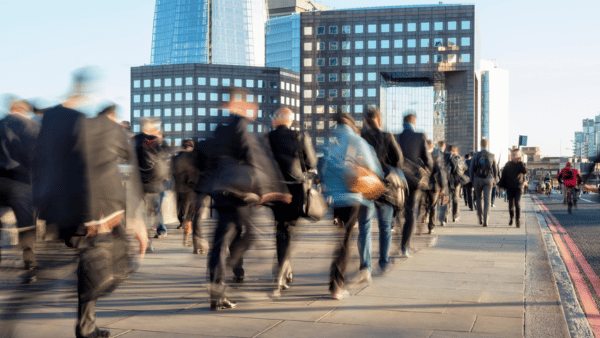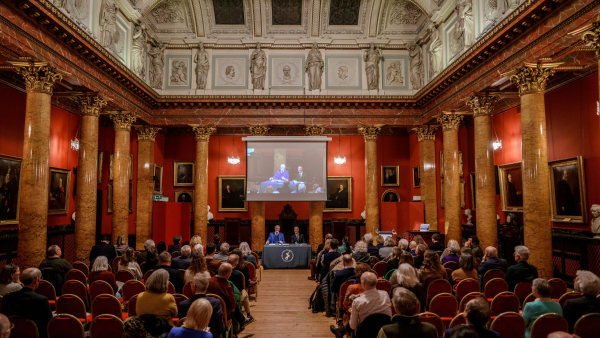The latest report from the Intergovernmental Panel on Climate Change (IPCC) shows that global warming is “widespread, rapid and intensifying”; it is also frightening. Meilin Chan FRSA asks how younger generations can move from climate anxiety towards sustainable change.
We are living in the climate crisis and it is taking a toll on our mental wellness. In the US, therapists are reportedly seeing a growing number of patients expressing symptoms of ecoanxiety (defined as “a chronic fear of environmental doom” by the American Psychological Association). Although ecoanxiety is not specific to a single generation, younger generations will experience it in a longer and potentially more intense way.
Gen Z will spend the entirety of our lives amidst the climate crisis. In 2019, Amnesty International conducted a global Future of Humanity survey asking over 10,000 18-25 year olds what they believed was the most pressing issue facing the world. The top response was climate change (41%). A Pew Research Center Report found that Gen Z and Millenials are the most active generations when it comes to engaging with climate activism on and offline. Young individuals advocating for climate mitigation is wonderful but we must ensure that our climate activism is not consuming our mental wellbeing.
To find productive and effective ways to address climate change, we must stay climate conscious without allowing climate anxiety to rule our lives. In a Washington Post article, psychiatrist Elizabeth Haase expresses the need to find a middle ground between not addressing climate change and becoming completely consumed by it. How do we create a middle ground where we acknowledge the severity of the crisis while leaving room for focusing on solutions? How do we mobilize as a climate-conscious community to maintain momentum for a more sustainable future?
The RSA Future Change Framework
In April, I was lucky enough to help the RSAs’ Ian Burbridge with a Future Change Framework workshop focused on Covid-19 pandemic- induced emotional and mental fatigue. The Framework helped participants navigate their grief and anxiety from the pandemic.
Post-pandemic, we will still be facing a climate crisis and I wondered whether the RSA Living Change Approach could also help younger generations avoid emotionally and mentally dragging ourselves into states of paralyzing anxiety. To this end, I have adapted the Framework (below) – what we need to end, let go of, amplify and restart – to better fit this purpose. Feel free to interact with the Framework via the comment section.

End
The climate crisis may never reach a point where it ‘ends’; we must readjust our perspectives as goals and objectives shift while letting go of strategies that emotionally and mentally overwhelm us. What are the actions that have been taken in direct response to the crisis that are not sustainable in the long run?
First, we must stop allowing younger generations to bear the burden of the climate movement. We do need young voices in climate solutions but we should not rely on children and teenagers to be the voice of the movement.
In August of 2018, Greta Thunberg began Fridays for Future. Since then, Thunberg and many young activists worldwide spend their Friday school day protesting the inaction of government leaders towards climate change. With many global and private sector leaders just beginning to take serious action towards climate change, many in younger generations feel they must shoulder the responsibility to demand radical change. Although their actions are incredibly admirable, there is something eerily wrong with children and teenagers having to put their emotional, physical, and mental energy towards demanding global leaders to take action.
Second, we must end the normalization of BIPOC (Black, Indigenous, and People of Color) communities facing the brunt of environmental challenges, while also having to put their bodies on the line for the protection of natural resources.
If we are to strive for a sustainable future for all, we cannot ignore how marginalized communities face the brunt of climate change fallout despite contributing the least to it. Environmental racism, coined by the African American civil rights leader, Benjamin Chavis, describes how BIPOC communities are more exposed to pollution and environmental degradation. As the infrastructure of our cities and countries change, we cannot continue our historical pattern of environmental racism. Native American communities have recently had to fight against the construction of oil pipelines on their land (the Anishinaabe Water Protectors and Standing Rock Sioux Tribe have put and continue to put their bodies between pipeline construction and vital natural resources to defend sacred land). We must actively reject the normalization of overlooking BIPOC communities in environmental activism - environmentalism is not truly sustainable unless all communities are advocated for.
Let Go
The Framework defines this area as things we have been “able to stop doing”. I am reframing this section as actions that we must stop as they are unfit for our purpose. What collective actions or mindsets do we need to relearn as our current ones are unbeneficial in the long run?
First, we must let go of our focus on the frightening impacts of climate change without acknowledging current solutions and efforts to find future solutions.
It is crucial to understand the mechanisms of climate change: the causes and what the effects will be. However, we should not neglect to ask and understand ways we can mitigate these changes and implement solutions. We must find a balance of understanding the ‘worst case scenarios’ of climate change while also learning about the current and potential future solutions. Although it is tempting to cling to the more gruesome details, doing so prevents us from progressing towards the sustainable solutions that we need.
Second, we must let go of our perspective that humans are separate from natural systems.
In the ecosystem conservation field, there has been a focus on preserving or restoring natural areas to states ‘before’ human interaction. Although we must protect ecosystems from heavy extraction and pollution, we cannot continue to view ourselves as outside of these ecosystems. The truth is, there are no ‘pristine’ natural areas that are untouched by human influence. With climate change, every living system on our planet will feel the effects of this human-caused issue. And we cannot ignore that Indigenous communities have lived within and been protectors of vital ecosystems across the globe. If we are to craft a sustainable future for ourselves, we must recreate our communities into ones that integrate ourselves into local ecosystems.
Amplify
These actions are the result of the climate crisis and may even be direct responses to past actions that did not work out. What are new ideas and mindsets that we must continue to adapt and implement for a sustainable future for all?
First, we need to amplify BIPOC voices in the environmental movement and focus on environmental justice.
The environmental field has been historically skewed towards one perspective. Around 83% of environmental scientists and geoscientists are White. Although it seems that race isn’t related to the environment, how an individual may experience climate change or environmental degradation is often related to their race. Marginalized communities contribute the least to climate change in comparison to wealthier and whiter communities, but are at higher risk of experiencing displacement, crop shortages and drought. Indigenous communities also play a huge role in the preservation of natural resources and ecosystems. Although only 5% of the world’s population, indigenous peoples currently protect over 80% of the world’s biodiversity.
We cannot tackle the climate crisis if we exclude the voices of those who are at the frontlines of the environmental and climate crisis. Only an inclusive climate movement will ensure a more sustainable future for all. Leah Thomas (founder of Intersectional Environmentalist), Dr. Ayana Elizabeth Johnson (co-founder of Urban Ocean Lab), and Autumn Peltier (Chief Water Commissioner for the Anishinabek Nation) are a few examples of current intersectional voices in the climate movement. Please do add examples of individuals or new perspectives that you believe should be amplified in the comment section.
Restart
Compared to the enormity of climate change, hobbies can seem minuscule. However, they could be the key to our emotional wellbeing through the waves of the climate crisis. What are the parts of life that we have missed out on but must work to bring back?
We need to allow ourselves to set aside time and emotional space to feel joy and focus on other aspects of life outside of the climate crisis.
Sometimes in a crisis, we can feel guilty if we aren’t constantly focused on the issue at hand. However, the climate crisis is such an immense issue that if we focus all our physical and mental energy on it, we will wear ourselves down before we can find solutions to combat it. If we reintroduce activities and things that bring us joy, we are reminded of the importance of why we must work to find solutions for environmental challenges. Joy should be the foundation of our climate activism and will carry us towards a more sustainable future.
Meilin Chan FRSA recently served as a Community Operations intern with RSA US. She is currently pursuing a Master of Environmental Management at Duke University and hopes to change current business structures into more cyclical and sustainable ones.

Become an RSA Fellow
The RSA Fellowship is a unique global network of changemakers enabling people, places and the planet to flourish. We invite you to be part of this change.
Related articles
-
Counting the cost of bowling alone
Blog
Andy Haldane
In his 2025 CEO Lecture, Andy Haldane addresses how the ever-increasing cross-border flows of goods, people and information affect widening divisions and accelerate the depletion of social capital.
-
Andy Haldane, CEO of the RSA, calls for ‘social connection revolution’ to reverse economic and social decline
Press release
RSA CEO Andy Haldane delivered his annual Chief Executive’s Lecture to a sold-out audience at RSA House.
-
The 2024 Angus Millar Lecture
Fellowship news
Fionna Monk
The 2024 Angus Millar Lecture was led by award-winning novelist Andrew O’Hagan on the theme of 'Art, Literature and Truth in the Era of Fake News, Algorithms and Artificial Intelligence'.




Be the first to write a comment
Comments
Please login to post a comment or reply
Don't have an account? Click here to register.